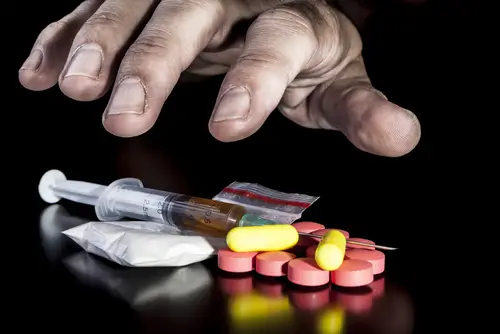Choosing between different dual diagnosis treatment centers can be difficult, especially if you’re unsure of your mental health needs.
Searching through treatment centers can also be challenging if you’re uncertain about what level of care you should choose, what therapy you might need, and which ones accept your insurance. The searching process can seem endless if you’re not one step closer to your goal.
This article explains what dual diagnosis is, how dual diagnosis treatment centers differ, their benefits, and aspects to watch out for that they offer.
What Is Dual Diagnosis?
Dual diagnosis refers to someone diagnosed with a substance use disorder (SUD), such as an alcohol or opioid use disorder, and a co-occurring mental health disorder. In some cases, a mental health disorder can lead to a substance use disorder, as individuals will use drugs to cope with anxiety, depression, or other negative feelings. In other cases, substance use disorders can cause a mental health disorder to develop and worsen the symptoms of both.
- According to the National Institute on Drug Abuse (NIDA), individuals with substance use disorders are twice as likely to have mood and anxiety issues.
- In 2021, SAMHSA’s National Survey on Drug Use and Health found that about 9.2 million adults in the US have both a mental health issue and a drug or alcohol problem.
- NIDA’s study shows that people with serious mental illnesses are four times more likely to get addicted to alcohol and five times more likely to smoke tobacco daily.

How Are Dual Diagnosis Treatment Centers Different?
Dual diagnosis treatment centers are different from traditional addiction programs focusing only on substance use disorders. Traditional programs aren’t intentionally neglecting or ignoring the connection between drug addiction and mental health disorders, but rather, they tend to have fewer resources or are underequipped to treat both.
Dual diagnosis treatment centers usually have traditional individual and group therapy methods that focus on substance abuse, including cognitive and dialectical behavior therapy, combined with healing modalities focusing on trauma, relationships, and emotions. An individual’s recovery journey will be more challenging if they leave addiction treatment with undiagnosed mental health disorders, unable or uncertain of what to do when negative emotions flare up.
Benefits of Dual Diagnosis Centers
- Improved chance of recovery: When substance use disorders and mental health issues are treated together, the chances of recovery are higher. Individuals will feel more confident about their recovery journey if they’ve learned and explored both diagnoses.
- Improved mental health: Mental health struggles are often hidden, but they’re just as real. Going through treatment that covers both mental health and addiction helps you break negative habits and learn positive and healthy coping mechanisms and grounding techniques.
- Improved physical health: Addiction physically harms your body, whether from using too much or being around other users of dangerous substances. But mental health issues can also affect your physical health. Feeling anxious or down can make it hard to wake up in the morning, shower, wash your face, or go outside. When your mental health needs are taken care of, your body will have the mental energy and strength to exercise, go for a walk, or play a sport.
- Improved quality of life: When you understand your body and mind and how addiction and mental health problems mix, you can feel more in control of your life and ready to face challenges. Accepting your situation can help you figure out your end goal and prepare for the steps and challenges along the way.

What Should You Look For?
You should look for a treatment program explicitly stating they provide dual diagnosis treatment and list evidence-based and mental health focus healing modalities.
Within the last decade, research indicates that only 18% of addiction treatment centers and 9% of mental health programs met the criteria for dual diagnosis-focused services. Other research indicates that 75% of addiction treatment programs categorized their own services as dual diagnosis capable, while independent objective evaluators found that only 25% of these centers met the requirements.
If you’re researching dual diagnosis treatment centers, here are some standard therapy methods and levels of care you should look for.
- Therapy methods that focus on mental health and emotions: Explore a treatment center’s services pages and find the therapy methods they offer. Look for experiential and holistic therapy services, such as yoga, breathwork, art, music, or adventure therapy, that help individuals with creativity, mindfulness, and relaxation. Scan for therapy methods focusing on healing traumatic memories and experiences, such as trauma-informed care, emotion-focused therapy, and eye movement desensitization and reprocessing (EMDR). Unhealthy and toxic relationships can also impact co-occurring disorders, so look for treatment centers offering attachment theory or trauma bonding.
- Mental health disorders they treat: Look for programs that offer treatment for common and uncommon mental health disorders, such as schizophrenia, bipolar disorder, obsessive-compulsive disorder, personality disorders, and ADHD. Most dual diagnosis treatment centers will treat depression and anxiety, but these are usually symptoms of serious mental illness (SMI) or a SUD.
- Treatment programs and levels of care: A structured and comprehensive dual diagnosis program should offer various levels of care to cater to various clients. Just as no one experiences a mental health disorder the same, their schedules and flexibility also differ and require custom plans. Inpatient and residential treatment programs are the highest levels of care, but they can be inconvenient for young adults and families with school, work, and responsibilities.
- Look for aftercare and family programs: Dual diagnosis treatment centers should focus on healing a person beyond individual counseling and on-site treatment. Once you graduate from a dual diagnosis treatment program, you’ll need help maintaining good coping skills and establishing vital life skills that may have been clouded by mental health conditions or drug abuse. It can also be difficult to reconnect with your family during or after treatment, so look for programs that offer family therapy sessions.

Red Flags You Should Look Out For
Here are some red flags you should look for when searching for dual diagnosis treatment centers.
- Their websites use stock photos and beautiful landscapes to divert from the absence of facility images.
- Treatment is the same for everyone; individual needs aren’t considered. “High success rates” claims are questionable due to personal differences and relapse.
- They emphasize the facility’s look over treatment quality. Luxurious amenities don’t cure addiction and usually indicate higher costs of treatment.
- They don’t have family therapy, and family involvement is limited. Good programs recognize the family’s importance in recovery.
- Their post-treatment plan is unclear. Reliable places have organized aftercare, relapse prevention plans, and alums programs that help clients stay on the path to recovery.
- Relapsing gets a client discharged without help. Quality programs have steps for relapses, like detox or another program.
Contact Launch Centers
If you or someone you know is struggling to find a dual diagnosis treatment center or unsure if they have a co-occurring disorder, contact Launch Centers in Los Angeles, CA. Our dual diagnosis treatment center is dedicated to helping young adults navigate through the world without the harmful effects of substance use disorders and debilitating mental health conditions. Call today, and one of our admissions agents can help you get started, providing insurance information, program descriptions and length, and treatment disorders.





